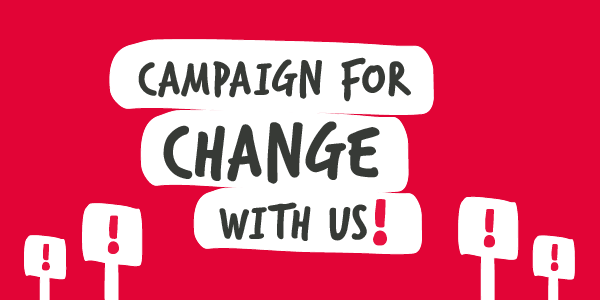Sunday 4 February marks World Cancer Day 2024. World Cancer Day is an awareness day established by Union for International Cancer Control (UICC). It aims to educate people about cancer, raise awareness and influence governments and individuals across the world to take action.
This year is the third and final year that the theme for World Cancer Day is “Closing the Care Gap”. The UICC is calling on leaders across the world to “create innovative strategies designed to confront cancer inequity”.
This mirrors similar calls from the Less Survivable Cancers Taskforce – of which, we’re a proud, founding member – to reduce inequity in cancer survival rates in the UK. Together, we called for government to help close the deadly cancer gap that means only 16% of people diagnosed with one of the less survivable cancers (brain, lung, liver, stomach, pancreas and oesophagus) will survive for five years or longer.
Recent analysis of international data by the Less Survivable Cancers Taskforce showed that five-year survival rates for brain cancer in the UK are worse than in most comparable countries. In fact, out of 33 countries of comparable wealth and income levels, the UK ranks 25th for average five-year survival.
Current NHS Cancer Programmes are clearly having an impact. Overall cancer survival in the UK has never been higher and average five-year survival rates for cancer increased by 8% between 2005 and 2020.
This is incredible progress but why aren’t these strategies having the same effect for people diagnosed with a brain tumour?
Brain tumours feel like the forgotten cancer!
Stephen, a member of our Strategy Steering Group
Why don’t current NHS Cancer Programmes work for the brain tumour community?
The short answer is that current NHS Cancer Programmes don’t work for the brain tumour community as some of their key areas of work aren’t that relevant to brain tumours:
- earlier diagnosis of cancer based on staging
- people taking steps, such as making lifestyle changes, to prevent cancer from occurring
- screening programmes.
We also know that some strategies to tackle cancer aren’t inclusive of people diagnosed with low grade, non cancerous brain tumours.
The government are currently working on their Major Conditions Strategy, which includes cancer as one of their six identified Major Conditions. We need this Strategy to recognise that brain tumours act in different ways to many other cancers.
Before this, they were going to develop a 10 Year Cancer Plan for England, but this was scrapped in favour of the Major Conditions Strategy. However, they are using the evidence submitted to the 10 Year Cancer Plan to develop the new Major Conditions Strategy.
Earlier diagnosis of cancer based on staging
NHS England currently has a target to diagnose 75% of cancers in stage one and two by 2028. But it’s unclear how earlier detection of brain tumours can be included in this target because they aren’t measured using the same staging that most other cancers use. This is because, unlike most cancers, brain and spinal cord tumours rarely spread to other areas of the body.
We’ve been encouraged by the Scottish Government’s commitment to addressing this issue. Last year, when the Scottish Government published its cancer strategy for the next 10 years, they specifically set out the need to find a way to measure cancers that aren’t staged.
This a great first step and we look forward to continuing to work with the Scottish government to develop these measurements.
If you’d like to find out more about the specific barriers and recommendations we have for improving brain tumour diagnosis, read our faster diagnosis report.
Cancer prevention
Prevention is a high priority in the NHS Cancer Programmes, and rightly so. For many cancers, there are clear evidence-based steps you can take to reduce the risk of developing cancer – for example, giving up smoking or cutting down on alcohol.
Unfortunately, only a very small percentage of brain tumours are preventable. That’s why we need to make sure that cancers that aren’t preventable are still prioritised by the NHS to lessen the impact of cancer.
Cancer screening
The NHS are also very focused on the roll-out of different and innovative screening programmes. This is closely linked with their target to diagnose cancer in earlier stages more often.
However, given the only way to identify a brain tumour is through a CT or MRI scan, we cannot have an appropriate screening programme.
Brain cancers also do not lend themselves well to targeted screening programmes for those identified with a higher risk of developing cancer, for example smokers or those with family history. This is because there are very few preventable risk factors when it comes to brain tumours.
Advocating for people diagnosed with low grade brain tumours
More than this, we know that not all brain tumours are cancerous. On average, nearly half (49%) of the people diagnosed with a brain tumour in the UK each year are diagnosed with a low grade brain tumour.
This means that any work that focuses solely on cancer will always leave out large swathes of our community. We know that people affected by low grade brain tumours face a complex set of difficulties – financially, physically and mentally.
We believe that everyone in the brain tumour community – whether they’re affected by a low or high grade tumour – deserve NHS and government backed strategies that are developed with their needs in mind.
What can you do to create urgently need change for the brain tumour community?
You can join the #WorldCancerDay conversation on social media by following #CloseTheCareGap
And, with Brain Tumour Awareness Month nearly here, now is the perfect time to get involved by signing up to campaign with us. We’ve got big plans to make sure the voices of the brain tumour community are heard but we can’t do it alone.

